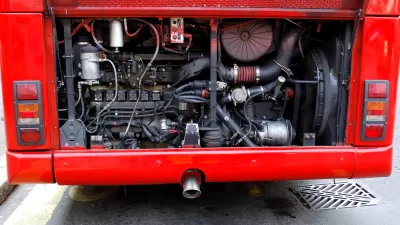New government efforts in South Africa are trying to improve mobility for those who rely on public transportation, walking and biking.
Progress is gradual, and the mobility issues facing the country are great.
"Sixty per cent of South Africans don't own private cars. They either walk or cycle to work – often an hour each way – or use public transport to travel the long distances created by sprawling, spatially segregated cities. The informal minibus-taxi industry takes the lion's share; the regulated rail and bus systems the rest. Public transport is, for the most part, unsafe, overcrowded, unreliable, expensive and run by operators who will at times (sometimes literally) kill their competition in order to keep their routes and licences.
The vast majority use it because they have no other choice. They can't afford the transport, public or private, that they'd prefer. Like Nyati, most commuters dream of owning their own vehicle. No matter how rusty, beaten up and unroadworthy a car might be, having your own offers the door-to-door flexibility that public transport does not. The magic number is R3,500 (about $452) – the monthly income at which low-income earners start putting out the word that they're looking for a used car."
FULL STORY: South Africa Renews Rail in Push to Reduce Congestion

Alabama: Trump Terminates Settlements for Black Communities Harmed By Raw Sewage
Trump deemed the landmark civil rights agreement “illegal DEI and environmental justice policy.”

Planetizen Federal Action Tracker
A weekly monitor of how Trump’s orders and actions are impacting planners and planning in America.

How Atlanta Built 7,000 Housing Units in 3 Years
The city’s comprehensive, neighborhood-focused housing strategy focuses on identifying properties and land that can be repurposed for housing and encouraging development in underserved neighborhoods.

In Both Crashes and Crime, Public Transportation is Far Safer than Driving
Contrary to popular assumptions, public transportation has far lower crash and crime rates than automobile travel. For safer communities, improve and encourage transit travel.

Report: Zoning Reforms Should Complement Nashville’s Ambitious Transit Plan
Without reform, restrictive zoning codes will limit the impact of the city’s planned transit expansion and could exclude some of the residents who depend on transit the most.

Judge Orders Release of Frozen IRA, IIJA Funding
The decision is a victory for environmental groups who charged that freezing funds for critical infrastructure and disaster response programs caused “real and irreparable harm” to communities.
Urban Design for Planners 1: Software Tools
This six-course series explores essential urban design concepts using open source software and equips planners with the tools they need to participate fully in the urban design process.
Planning for Universal Design
Learn the tools for implementing Universal Design in planning regulations.
Jessamine County Fiscal Court
Caltrans
Institute for Housing and Urban Development Studies (IHS)
City of Grandview
Harvard GSD Executive Education
Toledo-Lucas County Plan Commissions
Salt Lake City
NYU Wagner Graduate School of Public Service




























